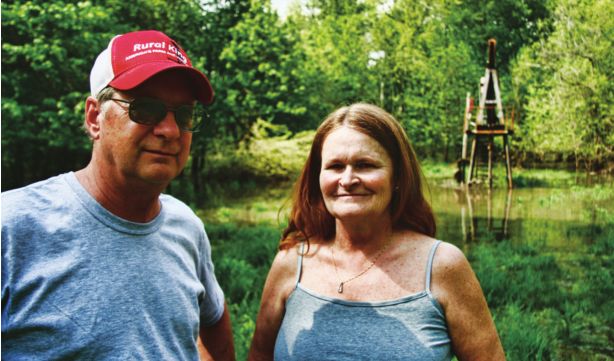
Oil wells not so well
Edinburg couple soured on oil production at their farm
OIL | Patrick Yeagle
Paula Cook has had it with oil.
She and her husband, Jim Cook, live on the 65-acre farm Paula’s ancestors owned 100 years ago. Located outside Edinburg, about 20 miles east of Springfield, the farm hosts a series of oil wells operated by Springfield oil company Bi-Petro, Inc.
The oil wells were installed before Paula and Jim purchased the property in 1986, but they happily signed on to receive payments for the oil extracted from the land from then on. They’ve come to regret that decision now.
The Cooks say that Bi-Petro has spilled oil and left other messes around their property, and they haven’t been paid in 13 years.
Skip Homeier, president of Bi-Petro, declined to comment on the situation, saying the Cooks had “nickel and dimed” him with nitpicking for several years.
“Those people are crazy,” Homeier said. The dispute started in 2005, when Bi- Petro bundled the wells on the Cooks’ land together with other wells in the same area into one production unit. Known as “pooling” or “communitization,” the practice generally results in all landowners within the unit sharing a portion of the oil proceeds.
Paula Cook says Bi-Petro told her in 2000 that the Cooks’ wells weren’t producing, so they didn’t receive any checks from 2000 on. Once Bi-Petro pooled the wells in 2005, the company offered the Cooks a payment for oil produced over the previous five years and asked them to sign a “division order,” which amends the numbers used to calculate how much money the Cooks would receive. Paula Cook refused to sign the agreement, which was backdated to 2000, because they didn’t agree to the pooling.
“I don’t sign backdated documents on principle,” Cook said.
Although Skip Homeier at Bi-Petro declined to talk in detail about the Cooks’ property, he did say that Peabody Coal Company purchased the mineral rights to that area in the 1920s, meaning the landowners have no legal right to expect payment for the oil extracted from their land. Bi-Petro pays them anyway, Homeier said, “out of the goodness of our hearts to make things fair.”
After the disagreement over the pooled wells, the Cooks’ relationship with Bi-Petro continued to deteriorate.
Jim Cook points out bumpy dirt roads on their property used by Bi-Petro to access oil wells. While the previous owners of the property had a provision in their contract stating Bi-Petro would consult them about where to place access roads, the Cooks’ contract appears to have no such provision. One of the roads created by Bi-Petro workers used to be a narrow ATV trail through the woods used by the Cooks’ grandchildren. Now it’s rutted and punctuated with mudholes that widen every time a heavy truck drives around an existing mudhole.
One of the wells on the Cooks’ land, located in a hayfield, recently sprung a leak and dribbled oil down a gentle slope toward a stream that eventually feeds into the Illinois River. Bi-Petro cleaned up the spill by scraping the contaminated dirt off and replacing it with fresh dirt. However, there were still several signs of a leak: puddles with oil floating on top, oil beneath tall grass that had been pushed over, and oil smeared into the tread tracks of heavy machinery.
The Cooks say they complained to the Illinois Department of Natural Resources, though they say that DNR simply told them, “it’s been cleaned up.” DNR did not respond to a request for comment by publication time.
While most of the Cooks’ land still seems idyllic, they can’t help but feel that it’s been sullied by Bi-Petro’s activities, and they have no intention of signing the backdated document that would see them paid for their past oil proceeds.
Paula Cook said defiantly, “I told them to call me when it’s enough to buy a new car.”
Contact Patrick Yeagle at [email protected].